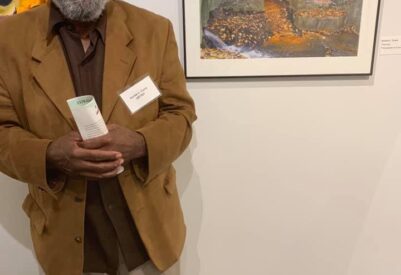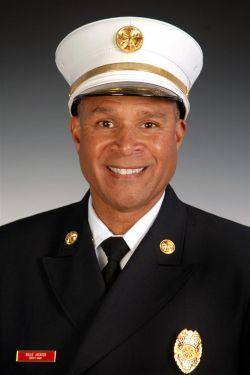
Rochester Police Department (RPD) newly appointed police chief Cynthia Herriott Sullivan felt comfortable and content with her involvement with various nonprofits geared to address important issues within the Rochester community after retiring in 2009.
Through twenty-four years with the RPD, Sullivan achieved the honor to become the second black woman in 2000 to make the rank of lieutenant since 1959 and in October she was sworn in becoming the first female police chief in the department’s 200 year old history.
Sullivan spent her adolescent years on the east side of the city of Rochester around the areas of Portland Avenue.
“I always like being out and working with people, problem solving but the law enforcement part came into play with Teen on Patrol, when I was in school,” Chief Sullivan said. “Also, I was raised to work hard and had some good mentors and good advice. One of those mentors told me, [when you are really good at what you do, you do not have to look for anybody, they will find you] and I always try to live by that.”
Southwest Tribune: What policing model will we see under your administration?
Chief Sullivan:
One that involves the community and partnership not us dictating to them but in partnership. I do like the 21st century policing model that was developed by former President Obama under his leadership. It is a lot of research and work with developing some key areas, where police departments can operate in and follow, and the end result is a better more trusted relationship with the community. Part of that involves what leadership we put in place, obviously. I need people that are going to be onboard with that. So, I advised people in our department that I am looking for competent, committed, ethical people. And I will start with that and teach them about the 21st century model but those foundational values have to be there. So, that is what I am working with. Partnership with the community. Working together and coming up with solutions together.
Southwest Tribune: In many of our urban cities throughout America we have police departments that are majority Caucasian and the majority of them do not live in the city. However, the city is composed of people mostly of color. Some say this current police model in our urban cities throughout America resemble Apartheid, a domination system practiced in Africa until the 1990s. How do we begin to make real success and showing an important institution like the police department can look like the people it serves?
Chief Sullivan:
That is a high task in some ways. So, a while back there was a national state and local training of a police advisory committee to look at ways necessary for police departments to be successful and I sat on that for several years. We would have discussions around issues like that and one of those was recruitment and how do you build your ranks with good people that will make good candidates. It is a strenuous process. It is hard to get good candidates’ period. I can understand the public concern and perception, but I also see internally, how hard we work to try to increase those numbers.
Southwest Tribune: You guys do partner to offer a program in the city school district, where students do have the opportunity to study and learn about law enforcement and get them on a track to one day enter the police academy. Can that program become more robust to help increase the number of minority recruits?
Chief Sullivan:
It is certainly something that I would like to take a look at. I am certainly open to that and any suggestions to help us have more success along the way.
Southwest Tribune: The RPD is under investigation regarding the death of Daniel Prude. Have you taken steps internally to make sure this won't happen again?
Chief Sullivan:
Well, first of all I want to stress it is the attorney general’s investigation and my focus is to get the department on track. I stated to you a few minutes ago about putting ethical, committed, competent leaders in place and those things go far in adjusting and impacting culture within law enforcement. These are the sort of things we expect from our staff members. And these are the things that get you awarded. That gets you selected for a leadership position. I am waiting to hear the attorney general’s findings. But I can say we are on track. We are committed. We are competent and we are going to be ethical with the public and the community and each other internally, by making the department a priority. I want to get it on track and set certain expectations internally, then the public benefits from that. I put up a 90-day plan and part of that involves everybody who is considered for promotional positions. There is a certain expectation that must be met before people are put in leadership roles. It sets a good tone, and the public gets our best. But the other part is that it sends a message internally with staff, that if you work hard, you do a good job and you know how to treat people, you are going to get promoted. You are going to get more opportunities. I am rewarding the behavior we want to see from our staff.
Southwest Tribune: In modern America, we are witnessing so many killings of unarmed black men by white officers. The go to explanation is always we need to retrain the officers, but the community is saying, re training does not work. What is your perspective?
Chief Sullivan:
No, I do not think training alone is the answer. I believe you have different situations and scenarios in different parts of the country but at the end of the day, we have to look at our process. We should know it is a problem. But not to turn the tables but I would like to ask you a question. I read this story several years ago that took place in the state of Florida. The FBI had a case where they had a wire and while listening, they became aware that a captain in that department and a the deputy chief were both members of the local Klu Klux Klan and the captain was the president of that chapter. So, I want to ask you a question. If there is an issue when it comes to excessive force or officer involved shooting. After what I just told you. Do you feel like retraining that captain, we had solved it?
Southwest Tribune: Absolutely not.
Chief Sullivan:
We got to screened better. You have to put ethical people in place. But when they are in and have been doing this job for a while, you have to be vigilant about how that person performs over that span of time. Are they experiencing burn-out? All those things we need to try to take a closer look at and address.
Southwest Tribune: What do you want the department to look like, when you decide to step down?
Chief Sullivan:
I want a good ethical, competent department with strong leadership in place that has the strength and courage to move the department forward in the direction it needs to go in. Knowing we are going to undergo some scrutiny. We are going to work through them. We are going to be better because of it. We got good people on the streets doing the best they can. We will do the right thing and will keep getting better.
Article by: Author and Journalist Rodney Brown, executive director of Brown Publishing LLC and Southwest Tribune Newspaper





